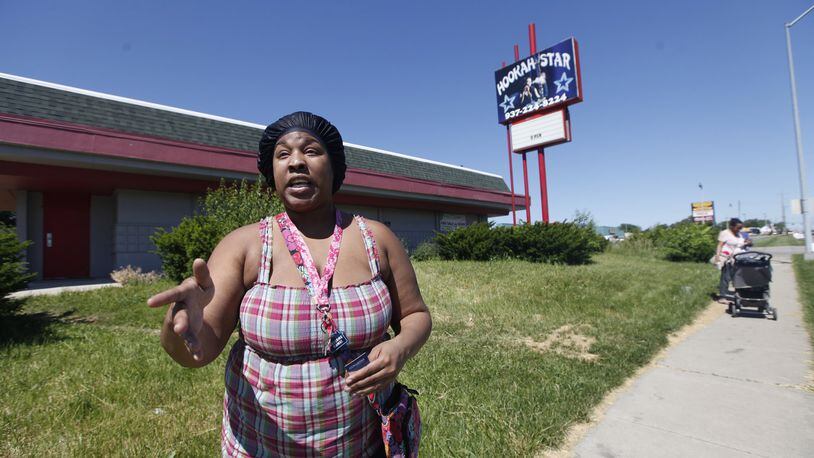The licensees are expected to open storefront operations in early September when Ohio’s new medical marijuana industry launches.
Many are looking forward to the new businesses and the increase in potential profits and tax revenue medical marijuana will bring to the state and localities. Others aren’t so sure the dispensaries will be good for their neighborhoods.
“I just think it’s going to add to a whole lot of problems,” said Crystal Newsome, 27, who is living right behind a property at 1875 Needmore Road in Dayton that received a license on Monday.
The building is a former hookah bar that had been the site of fights and a separate robbery and shooting in 2016.
MORE: Indictment returned in July shooting at Hookah Star
Keith Klein, Dayton’s senior development specialist, said with the addition of the two potential dispensaries along with the cultivator license already granted within the Dayton borders will give the city three potential new small business with another potentially coming should a processing operation get licensed.
“The city is looking at it from two perspectives, it’s an opportunity to support small businesses and entreprenuers in the community,” he said. “And the city supports the idea that people should have safe access to these products in order to potentially treat their medical conditions that qualify under the state’s program.”
Ralph Crawford lives in the Jaycee Towers a couple blocks from a location granted a dispensary license at 333 Wayne Ave., in the Oregon Historic District, already home to numerous bars, a brewery and a distillery.
“I think it’s great. I think it’s about five years later than it should be,” he said passing in front of the building Monday.
“It’s proven It does things for certain types of illnesses. Without a doubt, and a lot cheaper,” Crawford said. “We’ve got bars all around here. I don’t think it’s as bad as alcohol is.”
Here are the business names and where the stores will be in southwest Ohio:
Montgomery County: Pure Ohio Wellness LLC, 1875 Needmore Rd., Dayton; CannAscend Alternative, 333 Wayne Ave., Dayton; Schottenstein Aphria III LLC, 5604 Airway Rd., Riverside.
Greene County: Harvest of Ohio LLC., 4370 Tonawanda Trail, Beavercreek.
Warren County: Therapeutic Healing Care, LLC, 1525 Genntown Drive, Suite B, Lebanon.
Clark County: Pure Ohio Wellness LLC, 1711 West Main St., Springfield; Cannamed Therapeutics LLC, 0 Raydo Circle, Springfield.
Butler County: 127 Ohio LLC in the Village of Seven Mile in Butler County; CannAscend Alternative LLC, 300 No. Main St., Monroe.
MAP:
The licenses are distributed across 28 geographic districts. Three districts, including one that covers Miami County, did not have viable or any applications.
The 56 were among the 376 applications received for dispensary licenses, which will sell medical marijuana to registered, qualified patients whose licensed doctors have recommended they use the drug.
State pharmacy officials and North Highland, a consultant, spent six months reviewing and scoring applications based on business, operations and patient care plans as well as compliance with existing laws.
The Board of Pharmacy also hired an IT security consultant to double check the data integrity during the application process, after the Ohio Department of Commerce discovered scoring problems after the fact.
Hotline goes live, patient registry starts in July
The Board of Pharmacy expects to launch its patient registry in July.
Also, the Board of Pharmacy went live Monday with its medical marijuana toll-free help line at 1-833-4OH-MMCP (1-833-464-6627). The help line will respond to questions from patients, caregivers and health professionals about adverse reactions to medical marijuana and other related issues.
The announcement reflects the first round of dispensary licenses.
In June 2016, Gov. John Kasich signed a bill into law that authorizes use by patients with 21 conditions, including cancer or chronic pain, in the form of edibles, oils, patches and vaporizing. Patients and their caregivers will be allowed to possess up to a 90 day supply. Smoking or home growing it is barred.
In 2017 and this year, regulators with the Medical Marijuana Control Program have been writing rules for growers, processors, testing labs, dispensaries, patients and caregivers as well as reviewing and scoring applications for licenses. It is expected to be fully operational by September 2018.
Marijuana remains an illegal controlled substance under federal law. Despite that, 29 states and the District of Columbia have comprehensive medical marijuana laws and eight states have legalized recreational use, according to the Marijuana Policy Project. MPP notes that 20 other states have medical marijuana laws that the project deems insufficient.
